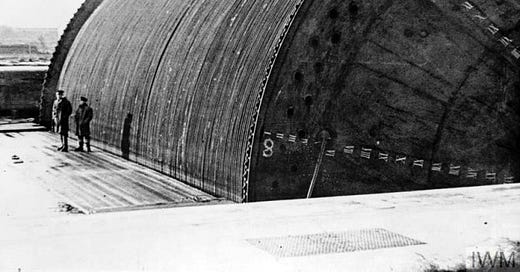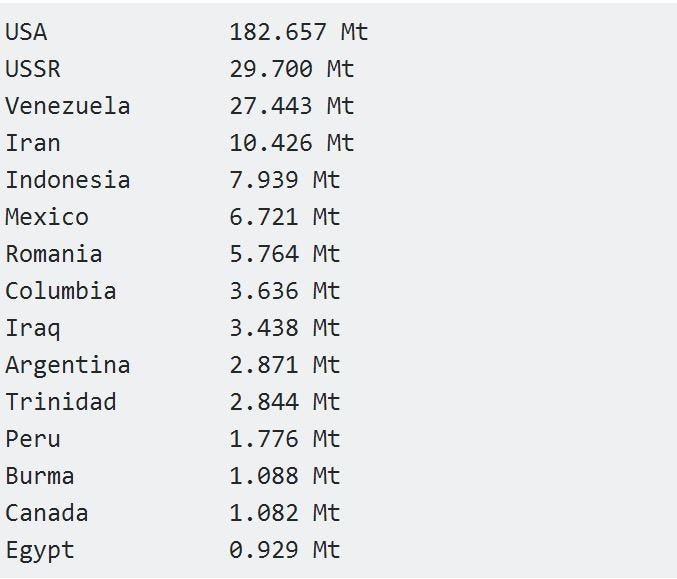This is reposting an article I published on LinkedIn in 2017 - my next SubStack post refers to it - hence reposting onto this platform
Maybe there was a certain pride, maybe even smugness, around the O&G industry a few years ago with oil at $100+... and despite the last 3 years of "downturn", remnants of this may even remain in some corners. Smugness, no, but pride, yes.
The reality now though, is that we are proud of an industry that is elsewhere perceived to be akin to tobacco, armaments and banking, vying for last place in the popularity stakes. At drinks and dinners, say you work in "Energy" not Oil... and feel the different reaction you get.
Currently, the O&G industry gets a good slapping at every opportunity, whether it be the Climate Change agenda (the Big Oil’s fault, not the consumers..), the happy-clappy renewables industry, or even reporting the pain the oil-price collapse has brought to our industry - you can feel the schadenfreude seeping through the mainstream media.
So maybe this is a good moment to reflect on what we do, and what we have done.
In 1914 Winston Churchill was, at the age of about thirteen and a half, First Lord of the Admiralty. His foresight and force-of-nature personality combined to radically alter the British Navy. In a now famous decision, he ordered the conversion of the British Dreadnaught fleet from the traditional fuel - coal - to the new combination of the internal combustion engine and oil. Back in those days there was no “politically correct” speak, no “trigger warnings” - the Ministry in charge was the Ministry of War - which at least was clear and to the point.
Dropping coal was a bold decision as the tiny islands of the UK had abundant coal resources and (at that time) no known oil worth speaking of. This was, from a geopolitical perspective, an odd, and appeared to some to be a suicidal decision.
As we know, you get more bang for your buck with oil - the energy stored per unit volume is second only to nuclear power. Bigger, faster ships with longer ranges were possible, and this decision altered the balance of the WWI naval arena.
This transition to oil for planes, tanks and ships set the scene for WWII, which was dominated by oil. Ironically at the start of the war, the USA was the biggest oil supplier to both Germany and Japan. In fact the US was by far the biggest producer in the world. Saudi oil wasn't discovered until 1937.
Global production in 1940
Neither Germany nor Japan had any domestic supply. Germany went after the Romanian oil fields and then swept across the central European plains and North Africa in a pincer movement to try and dominate the then biggest centres of production - the Caspian and Mespotamia. It has been argued that Stalingrad (and the sideshow of attacking Moscow) halting the advance to the oilfields in Baku, and El Alemein stopping the advance on the Middle East, combined to be the key turning point in WWII. The Germans had to rely thereafter on synthetic fuels from coal, which was considerably more challenging than using natural oil. There is a sad irony in the fact that the Afrika Corps and the British Desert Rats fought long and hard with a strategic view to Middle Eastern oil, all the whilst, driving back and forth in half-tracks and jeeps, right over the giant hydrocarbon fields of Algeria, Libya and Egypt. Meanwhile Lawrence of Arabia may have been a military genius, but again, he was no petroleum geologist...
In the 1930s, Japan was reliant on US oil imports, but these were embargoed in an attempt to dissuade it from further military excursions - having invaded mainland Asia in the mid 1930s. Japan reacted by making key resource related land grabs - Indonesia (as it is now known) had significant oil production (thank you RD/Shell) as well a most of the world's rubber, and then up to Burma.
About 6 years ago I visited the Yenangyaung Field in Myanmar - a field which first produced in 1887 - topping my visit to Baku and a field that first produced in 1894. Yenangyaung has thousands of wells drilled on it, yet now only a few are to be found. The well-heads were blown-up by the retreating British to prevent the Japanese from having direct access to the crude.
Meanwhile, the UK was supplied by tanker convoys from the USA. The allies focused, rather belatedly in bombing German fuel supplies. Answering the need for ever increasing volumes, production in the USA increased by 1mmbbls/d from 1940-1945 - a huge undertaking at that time. The infrastructure to get that oil to the world's war effort was built-out (Big Inch and Little Big Inch pipelines) and new chemical processes developed to make synthetic rubber... Indeed, another useful by-product of petroleum via crude refining, Toluene, is used in manufacturing explosives; nitrate it three times, and you get Trinitrotoluene (TNT).
The ability of the US to ramp up production and literally fuel the Allied war effort is an unseen and unrecognized achievement. Just one part of the bigger picture of the war, but a key one nonetheless. The Germans recognized this and targeted oil tankers as part of their U-Boat campaign. A sequence of mis-identification, and sinkings of (neutral)Mexican tankers, such as the Faja de Oro, and the SS Potrero del Llano in May 1942 led directly to Mexico joining the Allied war effort.
As the war progressed, mechanized warfare was lubricated by American (and Soviet) oil for the Allies and became an ever increasing headache for the Germans. The great centres of production, onshore USA and Siberia respectively were to all intents and purposes completely isolated from any frontline action and thus could be developed as quickly as human ingenuity could manage.
Whilst we think of the Nazi military as being highly mechanized, it was in fact only a small part of the war machine "only one-fifth of the Army belonged to mobile panzer and mechanized divisions". The German cavalry had been reduced from 18 regiments to 1 by 1939, but gradually increased in size, peaking at six cavalry divisions in February 1945 (source).
In 1940, mechanization of the US Army was well under way, but the Army still had two horse cavalry divisions. However, horses were totally replaced by mechanized transport with only four horses being procured in the 1943 fiscal year and none from then on through the end of the war. (source). The contrast in fortunes, with the allies amply supplied with petroleum products, and the Germans having to carefully manage supplies was further demonstrated in the Battle of the Bulge.
They had based their attack on a massive armoured onslaught that required massive amounts of fuel to maintain it and the Germans simply did not possess it. Allied bombing of fuel plants in Germany meant that such supplies did not exist. By mid-January, the lack of fuel was becoming evident as the Germans had to simply abandon their vehicles. The 1st SS Panzer Division had to make its way back to Germany on foot. (source)
Pipeline under the Ocean (actually the English Channel, but Operation Pluto sounded better that Operation PlutEc). The original coiled-tubing was a massive feat of engineering, which was absolutely critical to the success of the beachhead created by the D-Day landings. Worth a chapter in itself - a great overview here.
© Imperial War Museum (T 54)]
So in a dinosaur industry, disproportionally dominated by middle-aged white guys, who seem to be universally loathed - lets take a moment to think about just one small part of the 20th century. Not the incredible growth in prosperity since WWII that is directly correlated to oil use, not the taken-for-granted facility of every aspect of modern life that is predicated on cheap oil, the cheap vacations abroad, the convenience of suburban living, but think for a moment about how the Oil Industry was every bit as key to the Second World War as the code breakers, atomic scientists, front-line infantrymen, the women of the home front and the front-line, the special forces and the elite airmen.
Just don't hold your breath for a feel-good Hollywood movie about us :-)
The above quote comes from a much better and more informative blog-post on the same subject that I found when researching this post - highly recommended.






This is top notch. Just excellent, and all true. I assume Churchill was older than 13.5 when First Sea Lord?
Supply logistics are probably the most important part of every campaign.